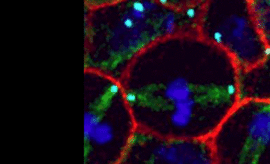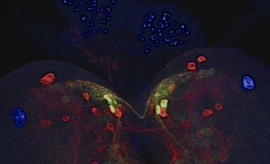Apical stress fibers enable a scaling between cell mechanical response and area in epithelial tissue
Biological systems tailor their properties and behavior to their size
throughout development and in numerous aspects of physiology. However, such
size scaling remains poorly understood as it applies to cell mechanics and
mechanosensing. By examining how the Drosophila
pupal dorsal thorax epithelium responds to morphogenetic forces, we found
that the number of apical stress fibers (aSFs) anchored to adherens
junctions scales with cell apical area to limit larger cell elongation under
mechanical stress. aSFs cluster Hippo pathway components, thereby scaling
Hippo signaling and proliferation with area. This scaling is promoted by
tricellular junctions mediating an increase in aSF nucleation rate and
lifetime in larger cells. Development, homeostasis, and repair entail
epithelial cell size changes driven by mechanical forces; our work
highlights how, in turn, mechanosensitivity scales with cell size.






